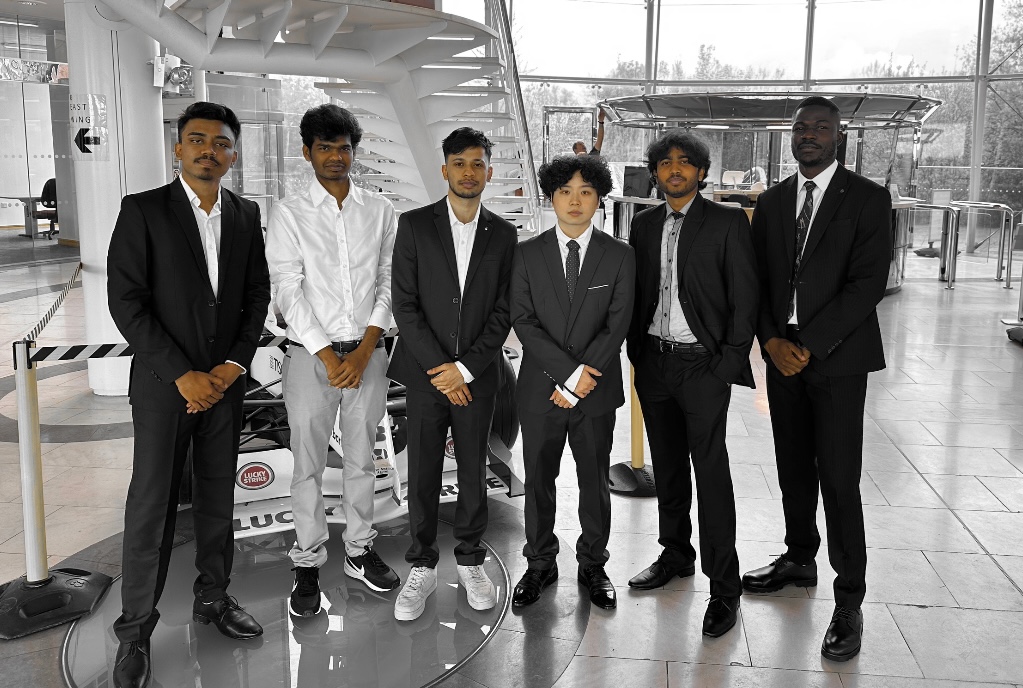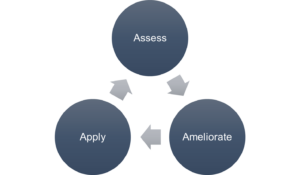Hubert Ovie Madise: My group design project
31/05/2023

‘Hubert Ovie Madise, what have you been up to the past ten weeks?’
The Cranfield School of Water, Energy and Environment (SWEE) Group Design Project (GDP) module – that’s what! The SWEE GDP module is one of the aspects of the Advanced Chemical Engineering MSc course that captivated me and led to my choice of this esteemed postgraduate institution.
As an individual committed to personal and professional growth, I highly valued my experience in the SWEE GDP module. It allowed me to engage in my passion for self-improvement while contributing effectively to the project’s success. Along my academic and professional journey, I have developed essential skills in effective communication (written and verbal), effective leadership, people management, time management, teamwork, problem-solving, project management, and critical evaluation. Despite achieving positive outcomes and receiving constructive feedback, I am always happy to improve.
Effective teamwork skills have proven to be instrumental in enhancing the overall quality of projects based on my personal experiences. I firmly believe that a cohesive group that maximises the potential of each team member is essential, especially in a diverse multinational environment. Moreover, I have come to realise the importance of critical evaluation and time management in complementing teamwork. These two aspects inspire innovative problem-solving approaches, leading to enhanced collaboration and expedited project completion.
During the initial stage of the project, I recognised the need for improvement in these crucial skills. This realisation was further reinforced during the midway peer review session of the SWEE Group Project module, where I received invaluable feedback from both my teammates and a staff member. While the feedback emphasised my strengths in communication, hard work, project management, and leadership, it also pinpointed specific areas that required further development.
As a firm believer in the power of feedback for personal growth, I have devised the ‘triple-A model’ – a comprehensive approach to self-improvement. This model encompasses three crucial steps: assess, ameliorate, and apply (as illustrated in Figure 1). By diligently evaluating my abilities through constructive feedback, I identify areas for enhancement and take proactive measures to make necessary improvements. A key element of this process is actively seeking ongoing feedback, allowing me to continuously assess, ameliorate, and consistently apply my refined skills. With this systematic approach, I confidently embrace growth and development as an individual.

Figure 1. Triple A Model
By embracing the triple-A model, I actively pursue a perpetual cycle of self-improvement. I harness feedback to enhance my abilities and achieve greater levels of performance. This introspective methodology empowers me to effectively tackle the weaknesses highlighted by my peers, honing my teamwork, critical evaluation, and time management skills with confidence and precision for the betterment of my team and our project.
Added to my improved essential skills, I have gained and strengthened technical and soft skills as a project manager, researcher, and experimentation and simulation data analyst in the SWEE GDP – “Conventional Flow Meters for Hydrogen Metering: Challenges and Solutions”. Our project involved extensive planning and culminated in a detailed 15-minute presentation to staff and clients. The project achieved notable success, and its findings have significant value for industry, government, academia, and stakeholders. I am pleased to report that our presentation received positive feedback, confirming the project’s success.
I would like to express my gratitude to my exceptional teammates – Yepeng Jiang, Bhuvan Poladiya, Abdul Rameez, Karan Gada and Gokul Raj Rajendran, whose contributions greatly impacted both the project and my personal and professional growth. They infused project management with an element of interest and enjoyment. It is also essential to acknowledge our remarkable tutor, Dr Liyun Lao, a Principal Research Fellow in Energy and Fluid Systems at Cranfield University’s Centre for Energy Engineering. His invaluable guidance and expertise played a crucial role in shaping the direction of this project, and I am genuinely thankful for his support.
Throughout this endeavour, I have experienced substantial growth in all areas I sought to improve, which has fuelled my enthusiasm for my future professional endeavours. I am eagerly looking forward to applying the skills and knowledge I have gained to make a meaningful impact in my career.
Categories & Tags:
Leave a comment on this post:
You might also like…
Keren Tuv: My Cranfield experience studying Renewable Energy
Hello, my name is Keren, I am from London, UK, and I am studying Renewable Energy MSc. My journey to discovering Cranfield University began when I first decided to return to academia to pursue ...
3D Metal Manufacturing in space: A look into the future
David Rico Sierra, Research Fellow in Additive Manufacturing, was recently involved in an exciting project to manufacture parts using 3D printers in space. Here he reflects on his time working with Airbus in Toulouse… ...
A Legacy of Courage: From India to Britain, Three Generations Find Their Home
My story begins with my grandfather, who plucked up the courage to travel aboard at the age of 22 and start a new life in the UK. I don’t think he would have thought that ...
Cranfield to JLR: mastering mechatronics for a dream career
My name is Jerin Tom, and in 2023 I graduated from Cranfield with an MSc in Automotive Mechatronics. Originally from India, I've always been fascinated by the world of automobiles. Why Cranfield and the ...
Bringing the vision of advanced air mobility closer to reality
Experts at Cranfield University led by Professor Antonios Tsourdos, Head of the Autonomous and Cyber-Physical Systems Centre, are part of the Air Mobility Ecosystem Consortium (AMEC), which aims to demonstrate the commercial and operational ...
Using grey literature in your research: A short guide
As you research and write your thesis, you might come across, or be looking for, ‘grey literature’. This is quite simply material that is either unpublished, or published but not in a commercial form. Types ...






